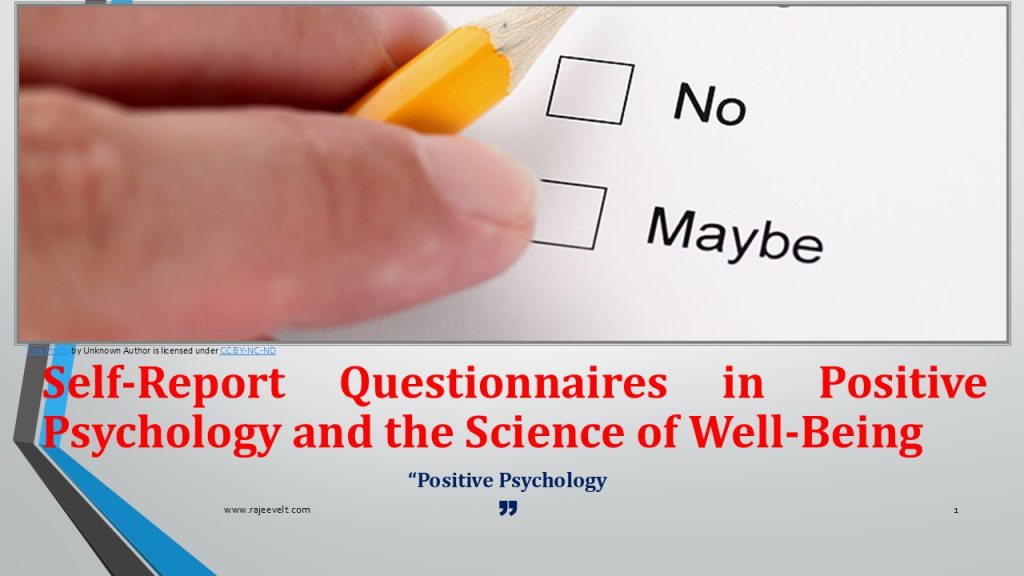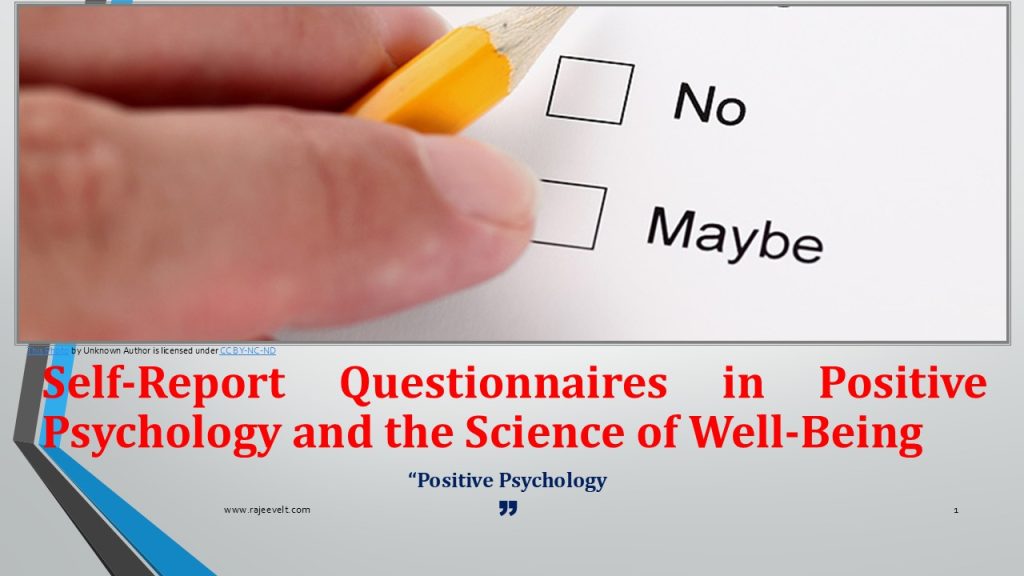
Why Measurement Tools Matter in Positive Psychology and Well-Being Science?
Self-Report Questionnaires in Positive Psychology and the Science of Well-Being
Why Measurement Tools Matter in Positive Psychology and Well-Being Science?
When we think of human happiness, flourishing, and the pursuit of a meaningful life, we realize that these are deeply personal experiences. Yet, to study them scientifically and apply them in real life, we need ways to measure them. This is where measurement tools play a central role in positive psychology and well-being science. Without reliable tools, our exploration of human strengths, virtues, and life satisfaction would remain vague and unstructured.
Measurement tools act as bridges between subjective experience and scientific understanding. They help us capture emotions, behaviours, and perceptions in ways that can be studied, compared, and improved. The measurement tools in positive psychology guide us in mapping the human experience of happiness, resilience, gratitude, and fulfilment in the same way that thermometers allow us to measure temperature and compasses guide us in unknown terrains.
One of the most widely used and accessible approaches is the Self-Report Questionnaire.

What is a Self-Report Questionnaire?
A self-report questionnaire is a structured tool that invites individuals to describe their own thoughts, emotions, behaviours, or attitudes. People reflect on their personal experiences and record them through scales, ratings, or open-ended responses instead of an external observer making judgments.
A person might be asked: “On a scale of 1 to 7, how satisfied are you with your life?” or “How often do you feel grateful in your daily life?” Individuals can offer researchers and practitioners a window into their inner world by responding honestly.
Self-report questionnaires are widely used in psychology because they respect the voice of the individual. After all, who else but ourselves can speak most authentically about our inner states of joy, hope, or meaning?
Strengths of Self-Report Questionnaires
Like every method, self-report questionnaires have their unique strengths:
Comparability and Standardization
Standardized self-report tools create benchmarks, allowing comparisons across groups, regions, and time periods.
Direct Access to Inner Experiences
They provide direct insight into emotions, thoughts, and attitudes that are otherwise invisible to external observation.
Simplicity and Accessibility
Questionnaires are easy to administer across different populations, cultures, and contexts—whether in schools, workplaces, or research studies.
Scalability
They allow researchers to collect data from thousands of individuals quickly and at low cost.
Empowerment of the Individual
Questionnaires give individuals an opportunity to pause, look inward, and articulate their experiences.
Weaknesses of Self-Report Questionnaires
We should acknowledge certain limitations despite their value:
- Subjectivity and Bias
Responses may be influenced by social desirability (wanting to look good), memory errors, or personal biases. - Lack of Depth
A checklist or rating scale may not fully capture the richness of a person’s lived experience. - Cultural Differences
Words and concepts may carry different meanings in different cultures, leading to variations in interpretation. - Response Fatigue
Long questionnaires can tire respondents, reducing accuracy and sincerity. - Honesty Issues
Some individuals may choose not to reveal their true feelings, either consciously or unconsciously.
When designed thoughtfully and used alongside other methods, self-report questionnaires remain an invaluable tool in positive psychology and well-being research.
A Sample of Self-Report Questionnaire
Below is a simple illustrative questionnaire designed to measure aspects of well-being through the lens of positive psychology.
Self-Report Questionnaire: Flourishing and Well-Being Scale
Instruction: Please read each statement carefully and rate how much it applies to your experience over the past month. Use the following scale:
1 = Strongly Disagree
2 = Disagree
3 = Neutral
4 = Agree
5 = Strongly Agree
- I feel that my life has meaning and purpose.
- I often experience gratitude for the people and things in my life.
- I am able to bounce back quickly after setbacks.
- I feel connected and supported in my relationships.
- I am engaged and interested in the activities I do each day.
- I am proud of the progress I make toward my goals.
- I maintain a hopeful outlook for the future.
- I often recognize and use my personal strengths.
Scoring: Add your responses. Higher scores indicate higher levels of flourishing and well-being.


How to Use Self-Report Questionnaires in Positive Psychology and Well-Being Science
The value of a questionnaire lies not only in collecting numbers but in how we use the insights that emerge. These tools can be applied in multiple ways:
- Self-Reflection and Awareness
Individuals can use questionnaires as mirrors to understand themselves better. Reflecting on responses can spark meaningful conversations with oneself. - Educational Settings
Teachers and counsellors can use them to assess students’ well-being, helping to design interventions that nurture resilience, gratitude, or purpose. - Workplace Well-Being Programs
Organizations can measure employee engagement, optimism, and satisfaction to foster healthier work cultures. - Therapeutic and Coaching Contexts
Counsellors, therapists, and life coaches can use questionnaires as entry points for deeper dialogue about strengths, struggles, and growth opportunities. - Scientific Research
Researchers rely on standardized questionnaires to build evidence-based practices, test interventions, and advance the science of happiness. - Policy Making
Governments and institutions can use large-scale survey data to shape public policies that enhance the well-being of citizens.
Conclusion
Self-report questionnaires are not just sheets of paper or sets of online forms—they are gateways into the human spirit. When we ask individuals to articulate their experiences, we acknowledge the dignity and subjectivity of every human being. While they are not perfect, their strength lies in their accessibility, authenticity, and ability to connect science with lived experience.
These tools remind us of something profound: that each of us is the ultimate authority on our own happiness, and that by measuring and reflecting on our inner world, we can take meaningful steps toward flourishing.
References
- Csikszentmihalyi, M. (1990). Flow: The Psychology of Optimal Experience. New York: Harper & Row.
- Fredrickson, B. L. (2001). The role of positive emotions in positive psychology: The broaden-and-build theory of positive emotions. American Psychologist, 56(3), 218–226.
- Peterson, C., & Seligman, M. E. P. (2004). Character Strengths and Virtues: A Handbook and Classification. New York: Oxford University Press.
- Seligman, M. E. P. (2011). Flourish: A Visionary New Understanding of Happiness and Well-being. New York: Free Press.
- Frankl, V. E. (1946/2006). Man’s Search for Meaning. Boston: Beacon Press.


